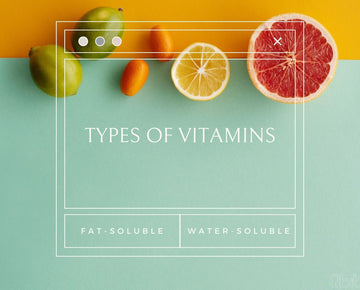What are Vitamins?
Vitamins are tiny little powerhouses that are like the superheroes of the nutrition world required in small quantities for normal body functions. They cannot be synthesized by the body, so they must be obtained through a balanced diet or supplements. Vitamins play a crucial role in maintaining overall health and wellness by supporting various body functions, such as energy production, immune function, and healthy vision, skin, and bones.
There are a total of 13 vitamins, classified into two categories: fat-soluble and water-soluble vitamins.

Types of Vitamins
There are two types of vitamins:
Fat-soluble vitamins.
Water-soluble vitamins.
Contrarily, the body does not store water-soluble vitamins; any excess is eliminated in the urine, so they must be consumed more frequently. Because they are not stored, it is less likely to consume too much of these vitamins and experience toxicity.

How many Vitamins are in total?
There are thirteen(13) vital vitamins that the human body needs to function properly. These are:
- Vitamin A – Retinoids and Carotenoids
- Vitamin B1 – Thiamine
- Vitamin B2 – Riboflavin
- Vitamin B3 – Niacin
- Vitamin B5 – Pantothenic acid
- Vitamin B6 – Pyridoxine
- Vitamin B7 – Biotin
- Vitamin B9 – Folic acid
- Vitamin B12 – Cobalamin
- Vitamin C – Ascorbic acid
- Vitamin D – Calciferols
- Vitamin E – Tocopherols and Tocotrienols
- Vitamin K – Phylloquinone and Menaquinones
These vitamins are essential for maintaining good health and wellness, and each has its unique role in supporting the body’s functions.
Fat-soluble vitamins include Vitamins A, D, E, and K, and they are stored in the body’s fatty tissues.
Water-soluble vitamins include Vitamin C and all of the B vitamins, and they are not stored in the body and must be replenished regularly through a balanced diet or supplements.

Who, How & Why of Vitamins – A to K.
Vitamin A
Vitamin A, a fat-soluble vitamin, is essential for maintaining overall health. It is also known as retinoids and carotenoids. This vitamin helps the body in many ways,
- Including keeping your eyesight healthy and sharp, especially in low-light conditions
- Supporting a healthy immune system,
- Aiding in the growth and development of cells, and
- Helping in maintaining healthy skin, hair, and nails.
A lack of vitamin A can lead to a number of problems, such as
- Night blindness
- Dry eyes
- Poor skin health, and a
- Weakened immune system.
To incorporate vitamin A into your routine, you can include foods that are rich in vitamin A in your diet, such as
- Liver
- Fish (like salmon, tuna, and mackerel)
- Eggs
- Dairy products
- Yellow and orange-coloured fruits and vegetables like carrots, sweet potatoes, and cantaloupe, as well as
- Spinach and kale.
Consuming vitamin A-rich foods is an excellent way to meet your daily requirements and keep your body healthy. If you feel like you are not getting enough Vitamin A in your diet, you can also consider taking a vitamin A supplement. However, it is always a good idea to consult a doctor first to avoid any unwanted side effects or interactions with other medications you might be taking.
In summary, Vitamin A is an essential vitamin that keeps our eyes sharp and immune system strong and helps grow and develop cells. Incorporating vitamin A-rich foods into your daily routine can help you meet your daily requirements and keep your body healthy and thriving.

Vitamin B
Vitamin B is a group of water-soluble vitamins that play important roles in various bodily functions, including energy metabolism, brain function, and the formation of red blood cells. The Vitamin B complex includes eight different types of vitamins, which are:
- Vitamin B1 (thiamine)
- Vitamin B2 (riboflavin)
- Vitamin B3 (niacin)
- Vitamin B5 (pantothenic acid)
- Vitamin B6 (pyridoxine)
- Vitamin B7 (biotin)
- Vitamin B9 (folic acid)
- Vitamin B12 (cobalamin)
Each B vitamin plays a specific role in the body, such as:
- B1 helps convert food into energy and keep the nervous system healthy
- B2 helps keep skin, eyes, and nervous system healthy
- B3 helps convert food into energy and maintains healthy skin, nerves, and digestion.
- B5 helps convert food into energy and maintain healthy skin
- B6 helps convert food into energy and makes red blood cells
- B7 helps convert food into energy and maintain healthy skin, hair, and nails
- B9 helps make red blood cells and convert food into energy
- B12 helps make red blood cells and keep the nervous system healthy

A deficiency in vitamin B can lead to a number of problems, such as
- Fatigue,
- Anaemia
- Nerve damage, and
- Skin rashes.
To incorporate vitamin B into your routine, you can include foods that are rich in vitamin B in your diet, such as:
- Meats such as chicken, beef, and pork
- Fish
- Dairy products
- Eggs
- Whole grains
- Nuts and legumes
- Leafy green vegetables like kale, spinach, and broccoli.
You can also consider taking a vitamin B supplement, but it’s always a good idea to consult a doctor first.
In summary, Vitamin B is a diverse group of essential vitamins that are necessary for a variety of bodily functions, including energy production, hormone synthesis, and maintaining a healthy nervous system. These vitamins are found in a wide range of foods, including meats, fish, dairy products, eggs, whole grains, nuts, leafy greens, and legumes. By incorporating these foods into your diet, you can help ensure that you are getting enough Vitamin B to keep your body healthy and functioning properly.

Vitamin C
Vitamin C also referred to as ascorbic acid, is a water-soluble vitamin known for its immunity-boosting properties and is vital for the production of collagen, which helps maintain the health of skin, hair, and nails.
Vitamin C helps the body in many ways, including:
- Acting as an antioxidant: Vitamin C acts as an antioxidant, protecting cells from damage caused by harmful molecules called free radicals.
- Collagen production: Vitamin C is necessary for the production of collagen, a protein that is important for the health of skin, hair, nails, and blood vessels.
- Iron absorption: Vitamin C aids in the absorption of iron from plant-based sources, which is important for the formation of red blood cells and the prevention of anaemia.
- Immune system support: Vitamin C helps to support a healthy immune system by stimulating the production of white blood cells, which are important for fighting off infections.
- Wound healing: Vitamin C plays a role in wound healing by helping to produce new tissue and blood vessels.
A deficiency of vitamin C can lead to a number of problems, such as
- Scurvy: Scurvy is a condition that is caused by severe Vitamin C deficiency. Symptoms can include fatigue, weakness, swollen and bleeding gums, and skin rashes.
- Increased risk of infection: Vitamin C is important for a healthy immune system, and a deficiency can increase the risk of infections and illness.
- Weak wound healing: Vitamin C plays a role in the production of new tissue and blood vessels, and a deficiency can lead to weak wound healing and delayed recovery from injuries.
- Anemia: Vitamin C aids in the absorption of iron, which is important for the formation of red blood cells. A deficiency can lead to anemia, a condition in which there are not enough red blood cells in the body.
Overall, it is important to ensure that you are getting enough Vitamin C to prevent these health problems. This can be done by incorporating Vitamin C-rich foods into your diet, such as
- Citrus and juicy fruits like lemons, limes, and oranges.
- Berries
- Kiwi
- Papaya
- Pineapple
- Mango
- Leafy green vegetables such as broccoli, spinach, and kale
In summary, Vitamin C is a powerful antioxidant that provides numerous health benefits to the body, including supporting the immune system and aiding in the production of collagen. It can be found in a variety of foods, including citrus fruits, kiwi, papaya, strawberries, pineapple, mango, and leafy greens. Incorporating these foods into your diet can help you meet your daily requirements and keep your body healthy. However, if you are unable to get enough Vitamin C through your diet, you can consider taking a Vitamin C supplement after consulting with a healthcare professional.

Vitamin D
Vitamin D is an essential nutrient that plays a crucial role in maintaining strong bones, healthy immune function, and overall well-being. It is a fat-soluble vitamin that can be obtained from certain foods and supplements, as well as through the synthesis in the skin after exposure to ultraviolet B (UVB) rays from the sun, which is why it’s often referred to as the “sunshine vitamin.”
Vitamin D helps the body in many ways, including:
- Assisting in the absorption of calcium: Vitamin D is necessary for the absorption and utilization of calcium, which is essential for maintaining healthy bones and teeth.
- Regulating the immune system: Vitamin D plays a role in modulating the immune system and can help reduce the risk of autoimmune diseases and infections.
- Supporting cell growth and development: Vitamin D is important for the growth and development of cells, including those involved in bone and muscle growth.
- Maintaining muscle function: Vitamin D helps to maintain muscle strength and function, which is important for mobility and balance.
Vitamin D deficiency over a prolonged period of time can cause several issues, including
- Weakened and softened bones known as rickets
- Increased risk of infections, and osteoporosis.
To increase your vitamin D intake, you can add foods that are high in vitamin D to your diet. These foods include
- Fatty fish like tuna, salmon, and mackerel
- Egg yolks
- Fortified foods like cereal, milk, and orange juice.
Another way to get vitamin D is by spending time in the sun but always using sunscreen to safeguard your skin from harmful UV rays. You can also consider taking a vitamin D supplement, but it’s always a good idea to consult a doctor first.
In summary, Vitamin D also referred to as the “sunshine vitamin,” plays a vital role in maintaining healthy teeth and bones, regulating the immune system, supporting cell growth and development, and promoting muscle function. To meet your daily Vitamin D requirements and keep your body strong and healthy, you can include Vitamin D-rich foods like fatty fish, egg yolks, and fortified foods in your diet, spend some time in the sun while wearing sunscreen, or take a supplement after consulting with a doctor.

Vitamin E
Vitamin E is a group of fat-soluble compounds that includes tocopherols and tocotrienols. These compounds have similar properties but different biological activities.
These compounds play crucial roles in the body. Vitamin E has various benefits for the body, including:
- Acting as an antioxidant, which helps prevent damage to cells caused by free radicals.
- Supporting a healthy immune system.
- Maintaining healthy skin and eyes.
- Assisting in the production of red blood cells.
A deficiency in vitamin E is rare, but it can result in a number of problems, such as
- Nerve damage
- Muscle weakness and
- Vision problems.
To incorporate vitamin E into your routine, you can include foods that are rich in vitamin E in your diet, such as:
- Almonds
- Sunflower seeds
- Spinach
- Sweet potato
- Avocado
- Swiss chard
- Bell peppers
To summarize, Vitamin E is an important nutrient that plays a crucial role in maintaining overall health. By consuming foods that are rich in Vitamin E, such as almonds, sunflower seeds, spinach, sweet potato, avocado, Swiss chard, and bell peppers, you can help to ensure that your body is getting the nutrients it needs. If you are considering taking a Vitamin E supplement, it is always best to consult with a healthcare professional first.

Vitamin K
Vitamin K is a fat-soluble vitamin that is made up of a group of compounds, including phylloquinone (also known as vitamin K1) and menaquinones (also known as vitamin K2). Although these compounds have similar properties, they have distinct biological functions in the body.

Vitamin K helps the body in many ways, including:
- Assisting in blood clotting, which helps prevent excessive bleeding
- Supporting healthy bones
- Helping to regulate blood calcium levels
- Playing a role in cell growth and development
Vitamin K is a crucial nutrient that helps the body in many ways, including:
- Assisting in blood clotting: Vitamin K plays a vital role in blood clotting by helping to activate certain proteins that are necessary for the clotting process. This helps prevent excessive bleeding and can be especially important in cases of injury or surgery.
- Supporting healthy bones: Vitamin K helps to regulate the deposition of calcium in bone tissue, which is essential for maintaining healthy bones. Studies have shown that people with higher vitamin K intakes tend to have stronger bones and a lower risk of fractures.
- Regulating blood calcium levels: Vitamin K is also involved in regulating the amount of calcium in the blood. This is important because calcium is necessary for many bodily functions, including muscle and nerve function, and too much or too little can cause problems.
- Playing a role in cell growth and development: Vitamin K is involved in the synthesis of certain proteins that are important for cell growth and development. This is why it is especially important for pregnant women and growing children to get enough vitamin K.
Despite being rare, vitamin K insufficiency can cause various issues, such as
- Easy bruising
- Excessive bleeding
- An increased risk of bone fractures.
To incorporate vitamin K into your routine, you can include foods that are rich in vitamin K in your diet, such as:
- Leafy green vegetables: Kale, spinach, collard greens, and Swiss chard are all excellent sources of vitamin K.
- Cruciferous vegetables: Broccoli, Brussels sprouts, and cauliflower also contain significant amounts of vitamin K.
- Fermented foods: Natto, a traditional Japanese food made from fermented soybeans, is one of the richest sources of vitamin K2.
- Meat and dairy products: Liver, egg yolks, and certain types of cheese are good sources of vitamin K2.
- Oils: Certain vegetable oils, such as soybean, canola, and olive oil, contain small amounts of vitamin K.
In summary, vitamin K plays a crucial role in maintaining healthy blood clotting, supporting bone health, regulating blood calcium levels, and promoting cell growth and development. To increase your vitamin K intake, you can incorporate vitamin K-rich foods into your diet, such as leafy green vegetables like kale and spinach, cruciferous vegetables like broccoli and cauliflower, carrots, Brussels sprouts, prunes and berries.

In conclusion, vitamins are essential nutrients for our bodies! From Vitamin A to Vitamin K, each one plays a unique and special role in keeping us healthy and robust. But sometime












